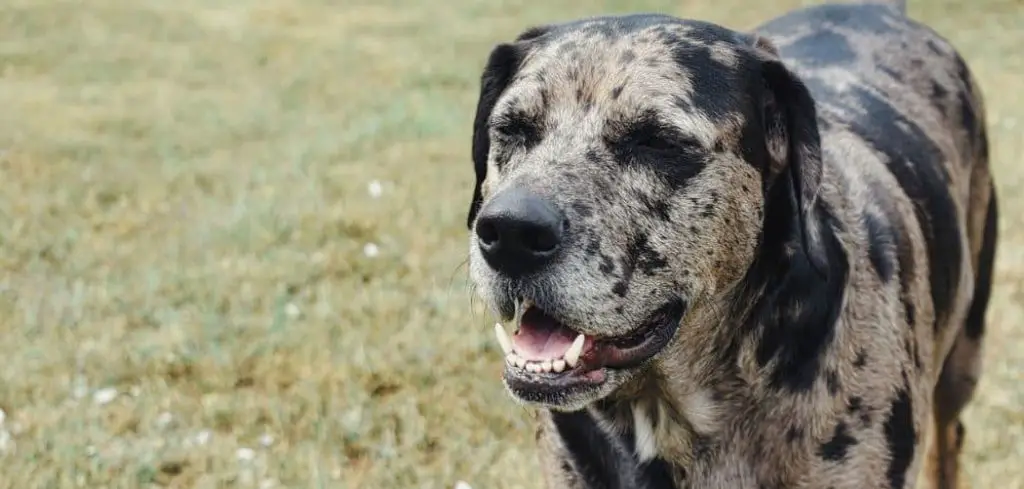If your dog is pooping mucus but otherwise seems to be acting normal, it can be both puzzling and concerning.
While mucus in stool is not always an emergency, it is a sign that something is irritating your dog’s digestive tract.
We outline the common reasons why your dog is pooping mucus but acting normal, what you can do at home, and when to seek veterinary help.
Dog Pooping Mucus but Acting Normal — Why It Happens
Mucus in your dog’s stool often means the intestines are inflamed or irritated. This can occur due to diet changes, mild infections, parasites, food sensitivities, or even temporary digestive upset.
Since your dog is otherwise behaving normally, the issue may not be severe, but persistent mucus should not be ignored as it can point to ongoing irritation that requires veterinary attention.

Dog Pooping Mucus but Acting Normal: Here’s Why
Dietary Changes
A sudden switch in your dog’s food can irritate the digestive tract. The intestines may produce extra mucus as a protective response.
Dogs who recently transitioned to a new brand, protein source, or type of diet may develop temporary mucus in their stool.
Even if your dog seems playful and energetic, the gut may still be adjusting to the change.
Read more: Dog Pooping Mucus and Blood (What it means)
Mild Gastrointestinal Infection
Just like humans, dogs can experience short-lived stomach bugs. These infections may cause mucus in the stool without affecting your dog’s energy or appetite.
Viruses and mild bacterial infections are often self-limiting, which is why your dog may still act completely normal while their intestines work through the irritation.
Intestinal Parasites
Parasites like whipworms or giardia can cause mucus in stool. In some cases, early stages of infection do not make a dog appear sick.
A dog may continue to play, eat, and drink normally while still shedding mucus in their poop.
Left untreated, parasites can lead to weight loss, diarrhea, or more serious illness, so veterinary testing is important if mucus persists.
Food Sensitivity or Intolerance
Some dogs are sensitive to ingredients like chicken, beef, or grains. These sensitivities can cause low-level intestinal inflammation that results in mucus-covered stools.
Unlike a food allergy reaction, which can cause itchy skin or ear infections, sensitivities are often limited to the gut. Dogs may still seem normal in behavior even while their digestive tract is struggling.
Colitis (Large Intestinal Inflammation)
Colitis refers to inflammation of the colon. In its mild form, mucus may be the only noticeable symptom.
Dogs with mild colitis can still have normal energy and appetite but produce stools coated in jelly-like mucus.
This condition can be triggered by stress, dietary indiscretion, or an imbalance in gut bacteria.
Stress or Anxiety
Believe it or not, stress can affect your dog’s gut. Boarding, moving homes, loud noises, or even changes in routine may trigger stress colitis.
The colon responds by producing mucus, even if your dog appears happy, playful, and otherwise healthy.
What to Do If Your Dog Is Pooping Mucus but Acting Normal
If your dog seems healthy but you notice mucus in their stool, you can start by monitoring them closely. Keep a stool diary to track how often the mucus appears and whether the consistency of the poop changes.
If you recently switched foods, try returning to the previous diet to see if the issue improves. Sometimes the gut just needs stability.
You can also add a small amount of plain canned pumpkin or a vet-approved probiotic to help soothe the digestive tract.
Make sure your dog has access to plenty of fresh water, as hydration supports healthy digestion.
If your dog is otherwise normal, you can often monitor at home for a few days before deciding if veterinary care is needed.
When to Call or Visit Your Vet
Even if your dog is acting normal, persistent mucus in the stool should not be ignored.
Call your vet if the mucus continues for more than a few days, worsens, or is accompanied by diarrhea or soft stools.
Seek veterinary care immediately if you notice blood in the stool, vomiting, loss of appetite, or lethargy. These signs suggest something more serious than simple digestive upset.
Your vet may recommend a stool sample test to rule out parasites or an infection. In some cases, a diet trial may be suggested to identify food sensitivities.
Read more: Dog Pooping Water and Not Eating (When to worry)
Key Takeaway
If your dog is pooping mucus but acting normal, it is often a sign of mild intestinal irritation from diet changes, stress, or minor infections. While many cases improve on their own, persistent mucus or any additional symptoms should be evaluated by a veterinarian.
Trust your instincts. You know your dog best, and if something feels off, reaching out to your vet ensures your pup stays healthy and comfortable.
